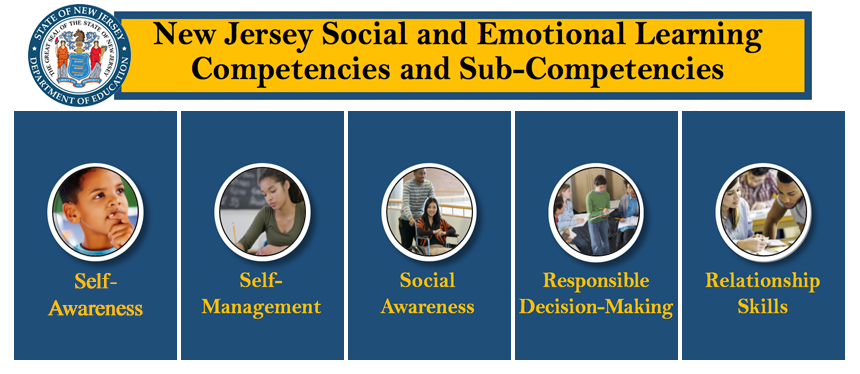sel
sel
Social & Emotional Learning
Social and emotional learning (SEL) refers to the process by which children and adults acquire and effectively apply the knowledge, attitudes and skills necessary to do the following: understand and manage emotions; set and achieve positive goals; feel and show empathy for others; and make responsible decisions.
View the NJDOE SEL Competencies: New Jersey Social and Emotional Learning Competencies and Sub-Competencies
Visit the NJDOE Comprehensive School-Based Mental Health Resources
Resources for Social & Emotional Learning
SEL Websites
20 Stress-Busters for Young Children -20 practical tips for your early childhood classroom
Butter- Based on the Best-Selling YA novel of the same name by Erin Jade Lang, Butter tells the story of a lonely obese boy everyone calls "Butter." Butter decides to make history, he is going to eat himself to death-live on the Internet-and everyone is invited to watch. This PG-13 movie that tackles mental health, suicide, and bullying in an engaging way. You can also use the free curriculum to help engage your students on these complex topics.
CASEL | What is SEL? - CASEL supports educators and policy leaders and enhances the experiences and outcomes for all PreK-12 students.
Social Emotional Learning – Inside SEL - Curates relevant headlines, policy updates, research, and resources from the field of social-emotional learning.
Jesse Lewis Choose Love Movement – Creating Safer Schools and Communities through SEL Culture - A nonprofit organization with a mission to create safer schools through a no-cost, lifespan SEL platform that not only teaches students the life skills that are essential to happiness and success, but also fosters a school culture that reduces violence from the inside out.
Make a Mindfulness Jar or Calming Timeout Timer - When things become too much for your little one, pull out this mindfulness jar to help your child relax and settle down.
Prioritize Coping and Calming Skills | AFIRM - Supporting individuals with autism to learn coping, self-management, and self-care skills is a priority during this time of uncertainty.
Random Acts of Kindness - Kindness matters! This foundation provides lesson plans and additional resources for K - 12th grades.
SEL in Digital Life Resource Center | Common Sense Media - Support your students' social and emotional learning as they navigate the digital world.
Sesame Street in Communities - Home - Hundreds of bilingual multi-media tools to help kids and families enrich and expand their knowledge during the early years of birth through six, a critical window for brain development. Our resources engage kids and adults in everyday moments and daily routines—from teaching early math and literacy concepts, to encouraging families to eat nutritious foods, to serious topics such as divorce and food insecurity.
Social and Emotional Learning | Common Sense Media - Learn more about character strengths like empathy, find actionable activities and edtech tools for the classroom, and discover ways to involve families in SEL learning.
Teaching Resources for Social and Emotional Skills | CenterVention - Teaching resources, including lessons and printables, classroom decorations, and behavior management tools that can be used together or separately.
Trauma & Disaster Related Resources
Creating Emergency Management Plans | Emergency Response and Crisis Management (ERCM) Technical Assistance Center - To ensure the safety of students, faculty and staff, schools and school districts nationwide should create comprehensive, multi-hazard emergency management plans that focus on the four phases of emergency management—prevention-mitigation, preparedness, response and recovery.
Coalition to Support Grieving Students: Modules - A collection of online modules to help support students during times of grief and trauma.
Coping Tips for Traumatic Events and Disasters | SAMHSA - Emotional distress can happen before and after a disaster. Coping strategies include preparation, self-care, and identifying support systems.
Guidelines for responding to the death of a student or school staff | School Crisis Center - These guidelines are designed to help school administrators, teachers, and crisis team members respond to the needs of students and staff after a loss has impacted the school environment, such as after the death of a student or staff member or when deaths occur that affect many people in the community.
Guiding Students and Families Through Grief - ASCD - Trauma response teams, grief circles, and ample preparation can help your school community process death.
Having hard but necessary conversations | Understood.org - Traumatic events have become all too commonplace in our lives and people are experiencing an endless cycle of emotions — anger, grief, anxiety, fear, and in some cases, helplessness. It’s nearly impossible for many of us to process so much pain, loss, and the resulting sense of insecurity that it has caused. When it comes to these serious issues, words and conversations are a necessity in being able to understand and work through things that may feel unexplainable.
How to Talk to Kids about Tough Topics - Sesame Workshop - Caring adults can help kids learn coping and resilience-building techniques to help them face tough challenges like divorce, foster care, grief, and more.
LRC-South | Family Resources: Social & Emotional Supports - Developing strong social and emotional skills will help your child as they work through challenges they encounter on a daily basis. These resources assist you in supporting your child’s SEL education, learning strategies for dealing with anxiety and stress, and preparing for post-pandemic life.
NASP Guidance for Reinforcing Safe, Supportive and Positive School Environments for All Students
National Center for School Crisis and Bereavement - Dedicated to helping schools support their students through crisis and loss.
NEA's School Crisis Guide - Educators know that when disasters such as hurricanes strike, children are often traumatized and they need help from families and educators to cope and heal. NEA's School Crisis Guide offers a step-by-step outline of what to do before, during, and after any school or community crisis like a natural disaster.
Quandary - A free, nonprofit teaching tool designed to engage students 8+ to develop critical thinking and perspective-taking, practice empathy, and learn to make ethical decisions through fun and engaging gameplay. Includes eacher guide, classroom implementation video, and lesson plans.
Readiness and Emergency Management for Schools Technical Assistance Center - The U.S. Department of Education’s Office of Safe and Supportive Schools administers the REMS TA Center to help education agencies, with their community partners, manage safety, security, and emergency management programs.
Supporting Schools During and After Crisis - Resources to support the use of a multi-tiered systems of support (MTSS) framework to support students, families, and educators during the transitions back to school during and following a crisis (e.g., a pandemic, natural disaster, other emergency) in a manner that prioritizes their health and safety, social and emotional needs, and behavioral and academic growth.
Talking to Children About Violence: Tips for Parents and Teachers- High profile acts of violence, particularly in schools, can confuse and frighten children who may feel in danger or worry that their friends or loved-ones are at risk. They will look to adults for information and guidance on how to react. Parents and school personnel can help children feel safe by establishing a sense of normalcy and security and talking with them about their fears.
Trauma & Grief | ChildMind -Every kid processes emotions differently and some benefit from professional support when coping with a major life change, grief, or witnessing or experiencing violence.
Traumatic Experiences - Sesame Workshop -Caring grown-ups can help lessen the effects of trauma and show children they’re not alone.
When Bad Things Are Happening | Learning for Justice - Recommended steps for navigating classroom discussions of unfolding crises in the news, based on the Psychological First Aid (PFA) framework and suggestions from the American School Counselor Association and The Child Mind Institute.

